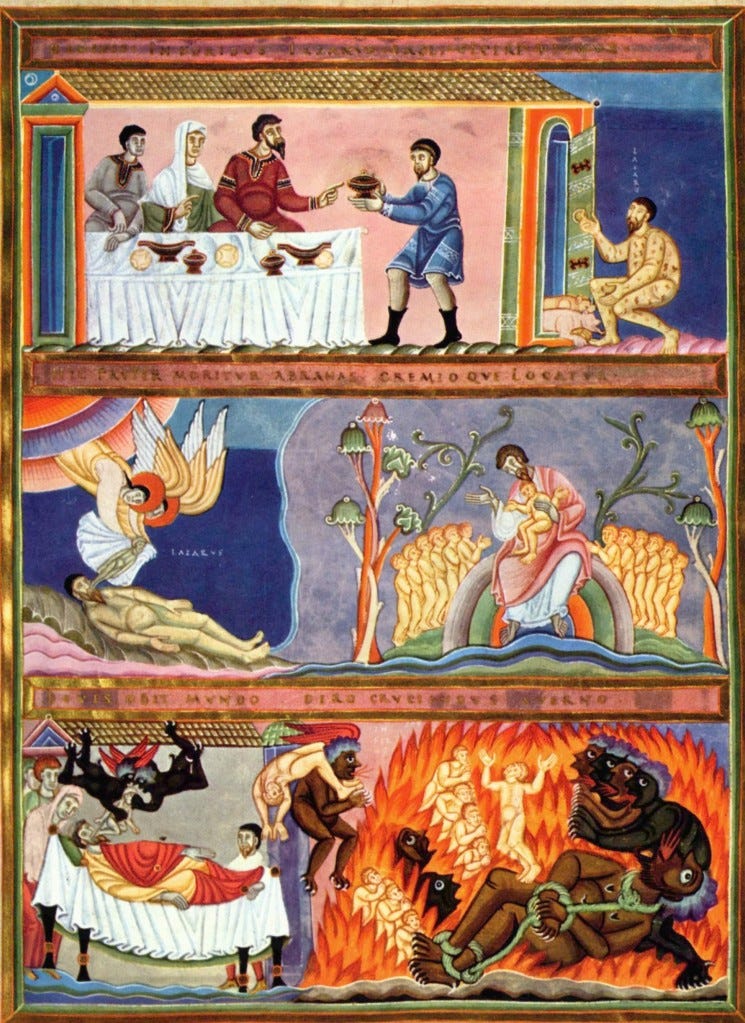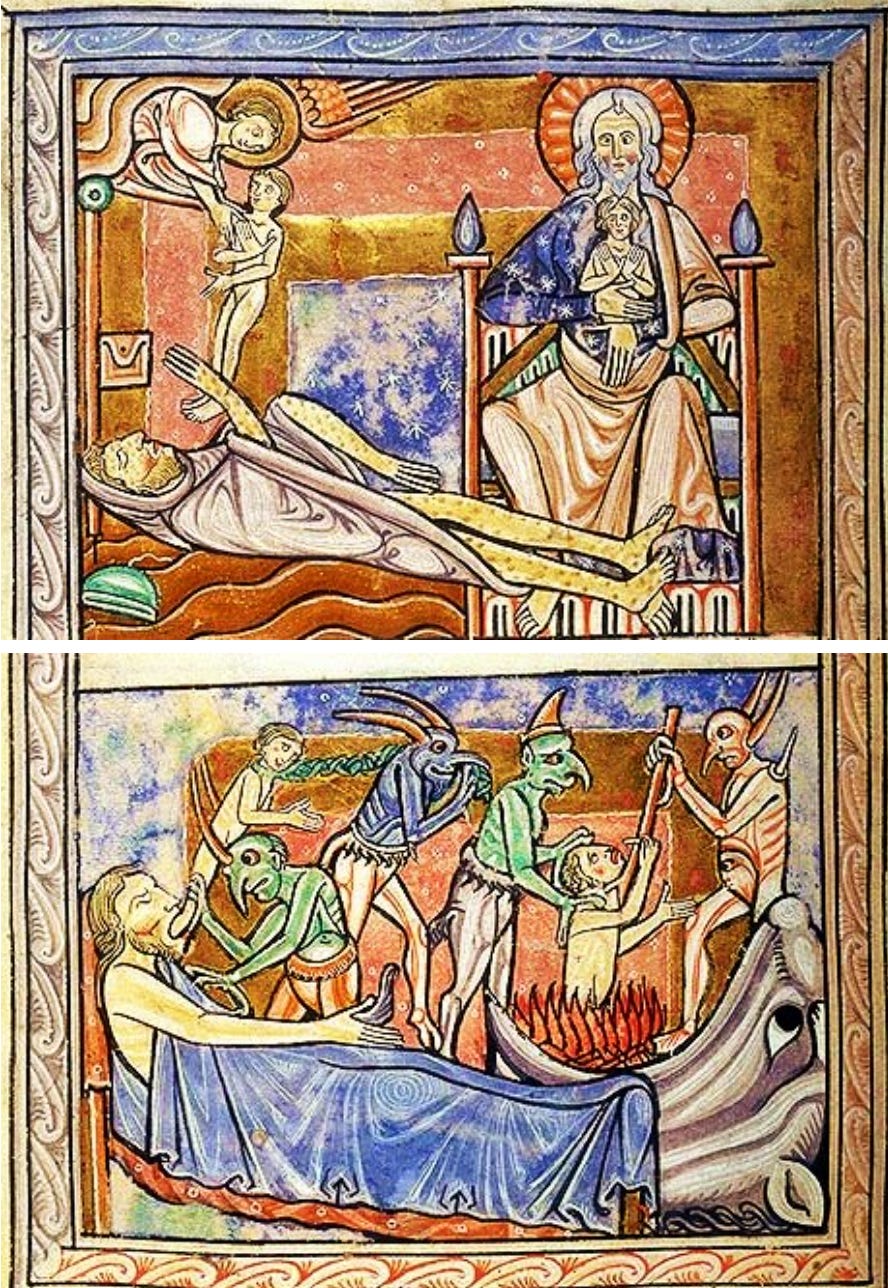Ghost posts can be found here.
There are no ghosts in the New Testament.
We do, however, find the language of spirits and references to death that can illuminate the subject.
When we read passages such as Matthew 8:22 (”Let the dead bury the dead”) and 22:32 (”God is not the God of the dead but of the living”) we may be confused. Is Jesus disregarding the dignity of the dead, or denying the need of people to grieve and mourn? Tobit was deemed a just man because he cared for the dead. Is Jesus saying something different?
We need to read these passages with two things in mind. First, there is the Jewish purity laws governing contact with the dead. The person burying a body would be rendered ritually impure: a kind of “death” that suggests that the “dead” do indeed bury the dead.
Second, there is the pagan background discussed in my previous post, with people sleeping on graves and seeking supernatural aid from the dead. Jesus is saying that God is the God of life and the living, and he grants no special power to the dead. “Why do you seek the living among the dead,” he will say in Luke 24:5.
Jesus has reversed death. Death is conquered, and essentially inverted. “He who saves his life will lose it.” (Matthew 16:25 and Luke 9:24) This is the new life in Christ.
It’s natural, then, for wayward spirits to have no part in this new life, for they represent an intermediary state, neither dead nor alive, that has no place in Christianity.
Phantasmas and Pneumas
Ghosts, however, were still part of the culture, and we see this in several places in the New Testament.
When Jesus walks on water, the apostles mistake him for a ghost. (Matthew 14:26, Mark 6:49)
But when the disciples saw him walking on the sea, they were terrified, saying, “It is a ghost!” [Greek: phantasma] And they cried out for fear.
When the women see him after the resurrection, he tells them not to be afraid, most likely because they would have feared he was a ghost. (Luke 28:10)
Then Jesus said to them, “Do not be afraid; go and tell my brethren to go to Galilee, and there they will see me.”
When he appears to apostles after the resurrection they believe they are a seeing a ghost.
But they were startled and frightened, and supposed that they saw a spirit [Greek: pneuma]. (Luke 24:37)
In the same scene, we witness again the supposed immaterial nature of ghosts.
See my hands and my feet, that it is I myself; handle me, and see; for a spirit [Greek: pneuma] has not flesh and bones as you see that I have. (Luke 24:39–40)
Two Greek words are used to convey the same essential meaning.
Pneuma is a breath of air, and by analogy, a spirit. It is used frequently in the New Testament, both for the Holy Spirit and for evil spirits. For example:
And immediately there was in their synagogue a man with an unclean spirit [Greek: pneuma]. (Mark 1:23–24)
Pneuma appears in Wisdom 17:14-15 with the same meaning:
But throughout the night, which was really powerless, and which beset them from the recesses of powerless Hades, they all slept the same sleep, and now were driven by monstrous specters [Greek: pneuma],and now were paralyzed by their souls’ surrender, for sudden and unexpected fear overwhelmed them. [Wisdom is one of the few OT books composed in Greek.]
Phantasma is what we’d call a ghost: an apparition or phantasm. We find it only in the scene where Jesus walks on the water, suggesting that he is displaying some power (lightness or immateriality) traditionally associated with phantoms.
These passages tell us that the idea of ghosts was known to the followers of Jesus. We also see recognizable qualities of these ghosts: they are immaterial, they’re scary, they represent the restless spirits of the dead, and they are light enough to walk on water, suggesting they float on the air.
Dives and Lazarus
Yet at the same time, the New Testament appears to shut the door firmly on the idea of ghosts who can wander the earth. In Luke 16:19-31, the story of Dives and Lazarus suggests that the dead can leave neither heaven nor hell.
In the parable, Dives (Latin for “rich man,” traditionally used as the man’s name) passes by the poor man Lazarus without helping him. When they both die, Dives goes to Hades and Lazarus to heaven.
From his place of torment, Dives sees Lazarus resting in the bosom of Abraham and begs him for comfort, or that he at least send a message to his family warning them to change their ways.
Abraham denies the first request, saying
Between us and you a great chasm has been fixed, in order that those who would pass from here to you may not be able, and none may cross from there to us. (Luke 16:27)
Although Abraham rejects the idea of people passing between heaven and hell, he doesn’t directly reject the possibility that Lazarus can return to earth as a spirit. The passage suggests that he won’t, because
If they do not hear Moses and the prophets, neither will they be convinced if some one should rise from the dead. (Luke 16:31)
Augustine used this passage to ground his treatment of ghosts, reading it as a denial of the ability of the spirits of the dead to pass to the world of the living. I don’t see it as quite that clear cut, but it certainly can be read as an indication of the impermeability of the veil separating life from death.
Next, we’ll turn to the complex relationship of the Early Church Fathers with the spirit world.






